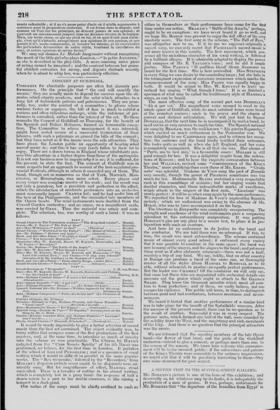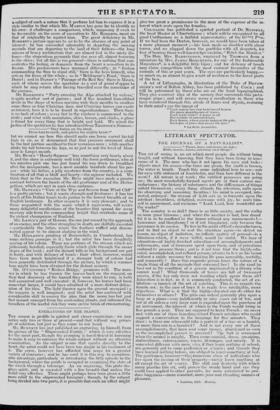A SECOND VISIT TO THE SUFFOLK - STREET GALLERY.
Mr. ROBERTS'S picture is one of the lions of this exhibition ; and deservedly so, for whatever may be its faults, it is indisputably the production of a man of gfenius. It was, perhaps, unfortunate for Mr. ROBERTS that "the departure of the Israelites from Egypt" is a subject of such a nature that it perforce led him to express it in a style similar to that which Mr. MARTIN has gone far to identify as his own : it challenges a comparison, which, supposing it even to be favourable on the score of execution to Mr. ROBERTS, must on that of originality be against him. The great deficiency in Mr. ROBERTS'S picture appears to us to be the absence of any point of interest : he has succeeded admirably in depicting the moving myriads that are departing to the land of their fathers—the long masses of heavy architecture that are almost lost in the misty dis- tance—the stupendous pyramids that rise over all, almost towering to the skies; but all this is too general—there is nothing that con- centrates the feeling, or demands from the heart a sensation in its favour. His predecessors have managed ditihrently : in "Joshua commanding the Sun to stand still," there is the hero himself, who acts as the focus of the whole ; so in "Belshazzar's Feast," there is Daniel ; and in DANBY'S "Passage of the Red Sea" there is Moses, each of whom serves the spectator as a sort of point d'appui to which he may return after having travelled over the remainder of the canvass.
Mr. EGERTON'S "Party crossing the Alps attacked by wolves,"
is quite another sort of picture ; and if five hundred lean-ribbed devils in the shape of wolves opening wide their mouths to swallow some three or four Christian men and Christian horses can excite an interest, here it is to be found in superabundance. Then there is no lack of colour ; every tint in the rainbow is summoned to the strife; and what with mountains, skies, horses, and cloaks, a place is found for every thing that is bright and boll. We admit the justice of the quotation he has introduced from Tuomsosis Seasons: "They fasten on the steed,
Press him to earth, and pierce his mighty heart :" but we cannot see how this should make one horse curvet his tail high in air, as if determined that that precious ornament shall be the last portion sacrificed to their voracious maw ; while another slinks his tail between his legs, so as just to suit the level of Mon- sieur le Loup's mouth.
Mr. Buss's "Hearty Squeeze" has something very hearty about it, and the story is extremely well told : the town gentleman, who at ten minutes past one has just found his way down to breakfast after the masquerade, has a most amiable lassitude about his per- son : while his father, a jolly rovsterer from the country, is a com- bination of all that is bluff and hearty—the squeeze included. We think that in the execution Mr. Buss might have made a greater contrast between the hands of the old gentleman and of the Metro- polit an, which are met in such close embrace. Mr. GLOVE RS "View of the Wye and Severn from Wind Cliff"
is a pretty picture ; but it wants strength and freshness: it has too much of the Italian touch to do justice to the honest breadth of an English landscape. In other respects it is very pleasant; and to those acquainted with the scene which it represents, will revive many delightful recollections of the beauties that spread far away on every side from the commanding height that overlooks some of the richest champaigne of England. Mr. LANCE'S pair of Herons, the one just roused by the approach of an enemy, and the other struggling in death, are skilfully executed —particularly the latter, where the feathers ruffled and discon- nected appear to be almost shaking in the wind.
Mr. HOFLAND'S painting of Borrowdaile, in Cumberland, has some striking passages in it ; but the artist has been dreadfully sparing of his colour. There are portions of the stream which are judiciously handled, especially those which glide through the easier slopes of the bank ; and the distant hills in the background are put in freely, and with delicacy of touch : their effect, however, would have been much heightened if a stronger body of colour had been generally distributed through the picture, by which a warmer tone might have been obtained for the distant scenery. Mr. O'CONNOR'S "Broken Bridge," promises well. The man- ner in which he has thrown the horses back on the waggorf, on their first discovery of the hazard they were about to run, is both well conceived and well executed : if, however, his horses had been somewhat larger, it would have admitted of a more distinct deline- ation of his idea. The light thrown upon the ground occupied 1%y the waggon is well imagined; and the artist has contrived with considerable skill to convey the idea that the moon has but just that instant emerged from the contending clouds, and informed the travellers of the fearful risk they were on the brink of encountering.



















 Previous page
Previous page